#and then the second book we read was beloved by toni morrison which is like. objectively better written and more substantial
Explore tagged Tumblr posts
Text
goodreads is a cursed place somehow every book that i think sucks ass has a 4.5 average rating and then every book that's like a culturally relevant classic that made important contributions to its genre has like a 2.5 and a million one star reviews calling it pretentious, overrated and stupid. genuinely who are you people
#soapbox#lmao like. my friends and i had a little book club thing right#and the first book we read was fried green tomatoes which we all disliked and agreed was weird & racist & poorly written#and then the second book we read was beloved by toni morrison which is like. objectively better written and more substantial#and has something to say about racism & the legacy of slavery#& like uses interesting and complex metaphors to explore that#anyway fried green tomatoes has a higher rating than beloved
46 notes
·
View notes
Note
hey man you got any good book recs, any genre lol
smiles gayly. yes I do friend. none of these are especially niche tho


first up is my favourite: Beloved by Toni Morrison. black historical horror, generational trauma manifested in the form of ghosts. sethe is haunted by her dead baby's ghost. I really struggled reading this the first time, but then I listened to the audiobook and it suddenly made sense. the prose is honestly better read aloud, but oh man is it good. like this is the thing that has inspired my writing style more than anything else
the second is a short story: The Ones Who Walk Away from Omelas by Ursula K Leguin. really really good. an allegorical story about a utopia. I don't want to spoil the twist if you don't know it


next up are FUN historical books. If Only They Could Talk by James Herriot. this is the first book in an autobiographical series about a veterinarian starting out in 1930s yorkshire. very good if you want something light, easy and funny as the chapters are short and snappy. eccentric characters that are a delight to read
Master and Commander by Patrick O'Brian. this is about a navy captain in the Napoleonic era and his weirdo little best friend who's a surgeon on his ship. this the beginning of the Aubrey/Maturin series which is 20 books long. now this is also very funny with great eccentric characters. but it's not easy. in fact I don't think you'll get much out of it unless you're really into the navy/sailing ships/pirates/history. black sails mutuals come here now


next up we have I Know Why the Caged Bird Sings by Maya Angelou. I thought this was essential reading but maybe that's just in the states cus nobody I know in the UK knows who Maya Angelou is. maybe it's cus they're white idk. truly an incredible woman, this is the first in her series of autobiographies. obsessed with her prose, and honestly it's a very easy read simply bc of how beautifully she writes. the subject material isn't easy as she was a black woman who grew up in the south in the 1930s but the journey thru her life is a wonderful one
A Thousand Splendid Suns by Khaled Hosseini. this is the book in the shadows of hosseinis more popular the kite runner, but I think this is the superior book. set in Afghanistan with two perspectives, Mariam who was a bastard child living rurally before the Taliban took over, and Laila who was an educated girl living in the capital city just as the Taliban took over. their stories intertwine when Laila becomes the second wife of Mariam's arranged husband. really not an easy book but a quite beautiful story and one that's stuck with me

last but not least, Kitchen Confidential by the late great Anthony Bourdain. I especially like this addition with his annotations written a decade or two after the books first publications with corrections and critiques and jokes about the book. this is an autobiography about his time as a chef and some of his philosophies for life. if you don't know who he is, he's like princess Diana for unemployed misanthropes. if you do know who he is and you haven't read it, do it now.
I believe that concludes my list. hope you enjoy them 🫶
4 notes
·
View notes
Note
15, 39, 47? <3
15. favorite book you read as a school assignment?
Picture of Dorian Gray! This was a bible belt public school, so obviously we just power skimmed right over any and all queer themes, but it was such a good fucking read. Toni Morrison's Beloved is a close second.
39. lemon cake or lemon meringue pie?
Cake, all the way, I think I'm burnt out on pie for life. When I was a kid my grandmother used to make like ten pies for thanksgiving in every possible flavor, which was amazing, but she opened a shop when I was in my lower teens and we worked for her for free over thanksgiving instead. We no longer speak for other reasons lol.
47. favorite type of cheese?
Call me a basic bitch, sure, but fresh mozarella.
Thanks for the ask:))))
Questions here!!
2 notes
·
View notes
Text
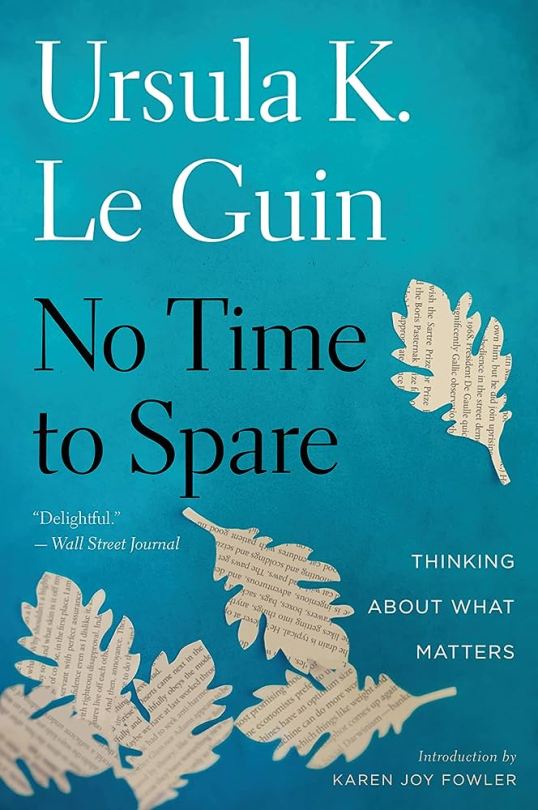
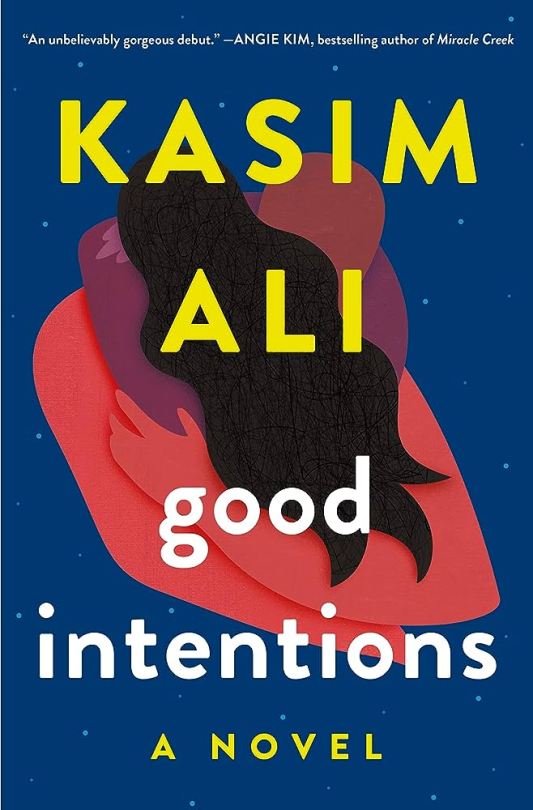
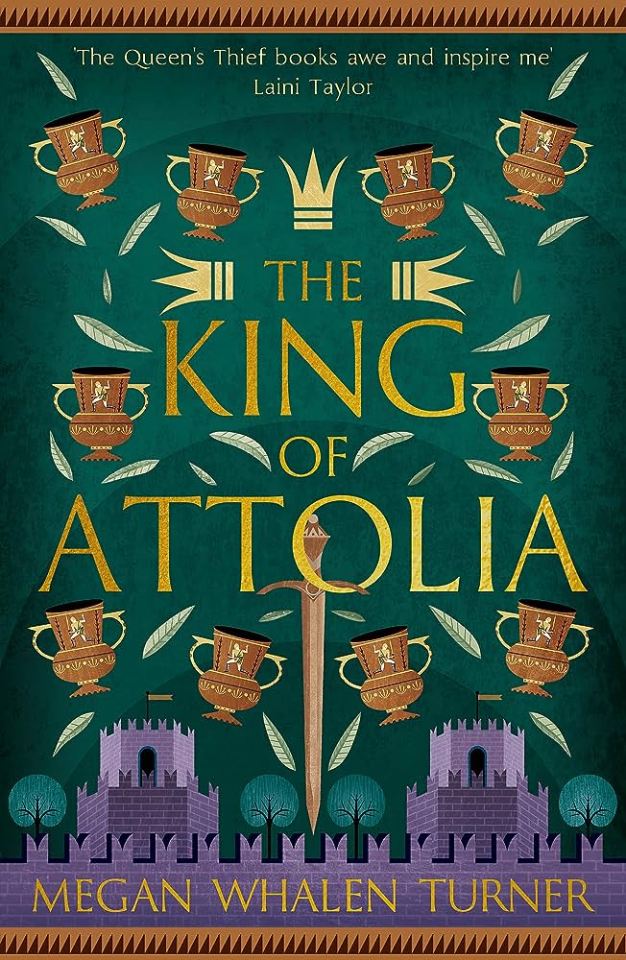




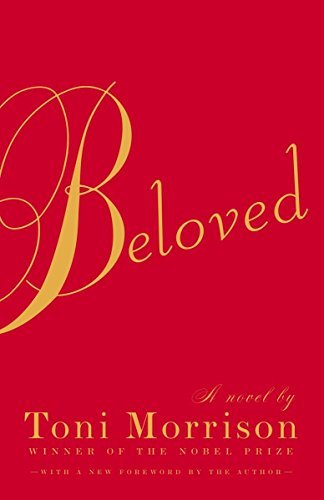

second tag meme and also from @ravenkinnie: book recs!
no time to spare / ursula le guin / i've been slowly trying to make my way through her essay collections and this is one i really love so far. i also read words are my matter but that one had some of her more questionable political stances so i enjoyed this one bc it was focused on more generic and personal topics
good intentions / kasim ali / i would honestly highly recommend this to south asians specifically bc i don't think i've seen any other book that holds south asian millennials accountable for their tendency to damn their parents to inflexibility from the outset and then fail to hold themselves accountable for never challenging traditional mindsets. this book specifically deals with anti-blackness within the south asian community and i think it does a fantastic job of it (please wait until the end bc it does end as it deserves to end but for a moment you will get worried towards the middle that it won't go that way lol. trust me)
the king of attolia / megan whalen turner / obv i would rec the queen's thief series in general but this is by and large my favorite of the whole series (well. bar the sixth book which closely ties with it) and much as i am sure everyone loved this series the most when it was from eugenides's perspective i cannot help but think that i never love eugenides more than when i read about him through the perspective of those who love him dearly
each little bird that sings / deborah wiles / this was a pretty formative book in my childhood esp wrt the concept of how children process death. it's actually part of a quartet of companion novels, each of which i love dearly and one of which is actually the inspiration for my current username, but i think this one is executed the best and it also happens to be the most well known installment, definitely for good reason
supreme inequality / adam cohen / i feel like if you're not necessarily into studying the law but want to gain a better, in-depth understanding of why we are where we are right now with american law this is a good book to read. it corrects a lot of misconceptions around the idea that the supreme court was ever consistently progressive (ie severe brevity and breakdown of the social welfare oriented burger era) and discusses the evolution of judicial interpretation of major topics over the course of the last several decades
the f team / rawah arja / this came as a rec in a melina marchetta newsletter and i'm so glad it did! it's a really fun and messy look into life as a lebanese-australian boy and what i think it does well is not shy away from culturally ingrained flaws, rather seek to dissect and understand them and highlight how crucial an emotionally mature and communication-dependent upbringing is for young muslim/arab boys. there are a few jokes here and there that caught the side eye from me bc they felt severely lacking in self-awareness but other than that i really enjoyed it
the piper's son / melina marchetta / my favorite marchetta novel forever and always, and the second installment in the inner west trilogy of companion novels, following saving francesca. what i really adore about this one is the interplay of grief between so many people and this guilt you have to overcome over the impact of the death of a loved one on your life. bc sometimes it utterly tears you apart and other times it brings you together and the emotions of that are so horribly complicated. i also simply adore the continued exploration of the main friend group and how as harsh as the girls are on tom they are so protective and dedicated, too, bc that's how they all are with each other. it's a book that constantly makes me ache
beloved / toni morrison / interestingly i find this book to be highly relevant considering the recent abortion fiasco in the american legal scene and its relation to abusive domestic situations but it's also one of the books i loved reading the most in undergrad particularly bc of its brutal exploration into how oppressed peoples are driven to self-inflicted violence as a last resort. can you blame a woman for killing her child when the only other option was damning that child to a life of slavery? it's a situation that has to be analyzed with so much empathy and compassion and that's exactly what morrison affords it
the secret garden / frances hodgson burnett / one of two other books i loved reading the most in undergrad (with the third one being north and south). i read this for a british literature class that i took at a time i was severely starting to doubt my degree again after having already gone through a really rough depressive period following jonghyun's death so it really opportunely entered my life. i remember reading the magic monologue towards the end and just crying and crying bc it felt so liberating and while the rest of my undergrad journey was not necessarily a total high i do think this helped comfort me a lot
tagging: @briarhips, @lateafternoonsunlight, @senorscotty, @dankovskaya & @infatuate !
17 notes
·
View notes
Note
what u reading now, or read lately, anything good to rec? also, some of your fave books in general?
i'm currently reading / just finished reading:
plain bad heroines by emily m. danforth (i believe she wrote "the miseducation of cameron post" too, which i haven't read yet. but this one is really good so far, i love the writing style, the sapphics, and the gothic imagery)
looking glass sound by catriona ward (i love her novels! "the last house on needless street" is one of my all-time favorites. this is her newest novel and it's a wild ride)
eileen by ottessa moshfegh (going to read this before i watch the film)
circe by madeline miller (i read this about a year ago after reading "the song of achilles" and as a fan of greek mythology, i adore madeline miller's works so much. she's a phenomenal author and storyteller)
family of liars by e. lockhart ("we were liars" was one of my favorite YA books as a teen, so i had to pick this one up! i'd highly recommend both)
all time favorites (besides the ones mentioned above):
beloved by toni morrison (one of the best novels of all time for a reason!!!)
and then there were none by agatha christie (my favorite whodunnit/murder mystery novel ever. i'd also recommend the BBC 2015 miniseries, it was a really good adaptation)
the long walk by stephen king (king wrote this under his pseudonym richard bachman; it was one of the first books he ever wrote. i read this in high school and have not been able to stop thinking about it since. highly recommend, especially since an adaptation is in the works! misery & pet sematary are my other two favorite king novels)
a storm of swords by george r. r. martin (his best book and the best asoiaf book and one of the best books of all time!!! would be amazing if he'd finish the damn series already though. or at least give us winds of winter. im begging. fire & blood is another all time fave but it's not for everyone; it's more like a history book. i love it though)
the book thief by marcus zusak (read this when i was eighth grade and was sobbing my eyes out in math class because i was reading it instead of paying attention)
the unbecoming of mara dyer by michelle hodkin (the entire series is fairly good. the og trilogy are my favorites, especially the second one. i started the series when i was in seventh grade and she still hasn't published the last book. i'm convinced she's trying to rival GRRM at this point. like girl. write that book!!!)
2 notes
·
View notes
Text
Finished The Navidson Record
Today, on the bus to and from work, I finished the main text of House of Leaves, and I want to share my thoughts.
This has been an utterly refreshing change of pace with regards to American horror, or to be precise with the American use of the supernatural. Allow me to elucidate y'all: to be quite frank with all those United Statians¹ gathered here, the use of the supernatural and fantastical in urban settings by white American authors is rather flaccid and uninteresting. which is why I'm unsurprised Mark Z. Danielewski pulled from Jorge Luis Borges, a Latin-American author (specifically Argentine). Much to my convenience and delight, Shinra Archaeology Department recently tweeted the following:
"FFVII: Advent Children director Nomura says Americans seem to have a compulsion to explain everything for why things are how they are. He thinks Japanese sensibilities allow for reality-defying action like you see in Advent Children. (Dengeki 325)."
Regardless of how you feel about FFVII: Advent Children, and FFVII itself, I think Nomura is spot on here. So far as I've read (up to page 528 of the second edition), so much is "unexplained" and ambiguous, much lost to the impenetrable dark. Let's take a classic in American horror, and thus of the white American use of the fantastical: It by Stephen King. I love the book myself bar the infantile understanding of racism I currently recollect, but one thing that I absolutely disliked was how Pennywise was a literal creature from outer space. It was the dumbest decision King could've made. Now let's compare this to Toni Morrison's Beloved: the titular character has an identity left to the dark. It could be the manifestation of the suffering of enslaved Africans, specifically of the protagonist, but it could also be a case of confused identity as some have argued. Either way the true contours of what occurred are left in inky corridors; what truly matters about the supernatural is how the characters interact with it. There's no cosmic plot or twist, unlike It.
Let's go back to Japan: the biggest manga and anime hits of the past decade have been Jujutsu Kaisen and Chainsaw Man, and in each there are spirits that society must not only deal with but for whose existences all are responsible: in JJK, Curses are the result of negative human emotions accumulating in a certain area; in CSM, Devils are the manifestations of humans' fears and they are powered by the fear itself. This is closer to Beloved than It. This isn't to say ambiguity isn't a thing in American fiction, it's simply to say that the American mindset often disallows anything other than a molecular understanding of ghosts and goblins. Nnedi Okorafor once said:
"In non-Western cultures, the mystical coexisting with the mundane is normal."
In House of Leaves, I think Danielewski takes this to heart and doesn't impede the beauty, horror, and gravity of the layers of unreality with some precise explanation of how the house functions. He specifically goes out of his way to demonstrate not only how hopeless it is, but, really, ridiculous, all while, to my ears, he mocks popular forms of analyses. I don't know his politics of beliefs, but he manages to embody and satirize how we tend to dissect fiction through Zampanò.
I could be misinterpreting the text, but it is humorous to read rather tongue-in-cheek jokes made against Freudianism and that "Viennese medicine man's"² bullshit in certain segments. The way Danielewski mimicked their voices, their prose, immediately summons the image of smarmy dickheads sitting next to their house fire writing their regurgitated trash out, nodding to themselves that a house representing a vagina is somehow a coherent take on the situation.
And yet despite the satire, Danielewski weaves in so much heart throughout, especially with Johnny or specific beautiful nuggets of prose such as that excerpt of the biography on Karen Green.
This book isn't duplicitous; rather, it's a unique whole, a cornucopia of terror, unreality, and what stands at the center of human existence: the dialectics between us and story, including the ones we tell ourselves for any number of innumerable reasons be it in ink or impenetrable streams of consciousness. Even the way Zampanò uses big words has a twofold nature: it's to commentate on how smartasses speak, but it's also an indulgence of language, something that I, a Nabokovian, adore to the fullest.³
I still have to read the appendices and the Whalestoe Letters, so perhaps my opinions will change, but these are my impressions up to page 528.
This is also one of the very few books to have truly scared me. The only other two have been the aforementioned Beloved, and Vladimir Nabokov's Lolita, which, for those unaware, does not side with its monstrous protagonist.⁴
A term I borrowed from Nabokov's Ada, or Ardor: A Family Chronicle. It's actually a great equivalent to the Spanish word "Estadounidense," which is a more accurate term for Americans. Estado=state, unido=united, and -ense denotes a person from a specific place. Literally one could say "United Stateser," but that's as graceful as calling someone a "Dominican Republican."
How Nabokov referred to Freud. I can't remember where. If you want a good if puzzled laugh, I recommend looking up the other shit the ol Russian said about the motherfucker who has ruined the name of Oedipus.
I say this like I can't be criticized for the exact same thing. Such is life!
See Jamie Loftus's Lolita Podcast
3 notes
·
View notes
Text
im doing the mid year book freakout tag
nobody tagged me but fuck it we roll
best book you've read so far in 2023?
its either A Feast For Crows by George R.R. Martin (duh) or Sula by Toni Morrisson. AFFC was just phenomenal, its one of those books i lost myself into and when i had to resurface i felt actual sadness because it was over, and i cant wait to reread it. Sula, however, is just perfect, i laughed and i cried, i felt so connected to the story and the writing just everyone go read Sula. its one of the best books to have ever been written.
i also reread My Brilliant Friend by Elena Ferrante and that is also the best book of all time.
best sequel you've read so far in 2023?
um AFFC!! or A Storm of Swords by George R.R. Martin. either one if those are phenomenal sequels. tbh i haven't read any other series this year so its either asoiaf or nothing, and storm and feast are my favourites.
new release you haven't read but want to?
nothing?? idk i havent read a new book in forever. maybe Yellowface by R.F Kuang or the new percy jackson book but i have no idea.
most anticipated release for the second half of the year?
unless its a surprise TWOW drop which isn't happening i have absolutely no clue.
biggest disappointment?
i'm sorry to all the fantasy fans out there, but i just finished Mistborn by Brandon Sanderson and i dont care for it. i really thought i would be more interested in the story but it was so meh for me i couldn't bring myself to care about anything or any characters. i did like the magic system.
i also reread The Pillars of the Earth by Ken Follet, which is a book i ADORED when i was like 14, ans im sad to say it folks but it was foul.
biggest surprise?
again ik this book is old but Slaughterhouse Five by Kurt Vonnegut FLOORED ME. i still think about that book constantly its so phenomenally written and ive owned it for years and never got to it because i thought it would be boring but it was completely excellent.
favourite new author (debut or new to you)?
Susan Sontag, David Foster Wallace and Toni Morrison. first time i read any of them was this year and what a waste of time to not have read them sooner.
newest fictional crush?
its jaime. ig he's from last year but yeah its jaime.
newest favourite character?
uhhhh jaime. jaime lannister. i am not better than this.
a book that made you cry?
My Brilliant Friend by Elena Ferrante. It's a reread but jesus christ that ending always gets to me, especially knowing what comes after.
a book that made you happy?
i cant seem to escape ASOS and AFFC, but genuinely my reading experience of asoiaf was unparalleled.
most beautiful book you've bought this year?
i went to the Libreria Lello (aka the world's most beautiful bookstore) and i got the most BEAUTIFL edition of Las intermitencias de la muerte by José Saramago.
what book(s) do you need to read before the end of the year?
i want to read Richard III by Shakespeare, A Tale of Two Cities by Charles Dickens, En diciembre llegaban las brisas by Marvel Moreno and Beloved by Toni Morrisson. hopefully i'll get through them all
anyways do this if you want you are officially tagged bye
sorry i dont read new books if you have any recs im mega down
1 note
·
View note
Photo


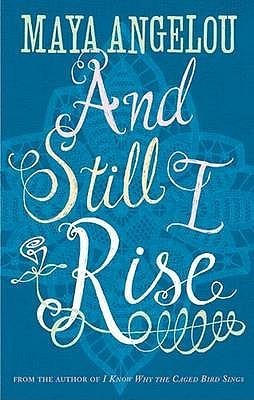

Black History Month: a variety of titles for you to read
Color: Essays on Race, Family, and History by Kenneth A. McClane
In 1991, acclaimed poet Kenneth A. McClane published Walls: Essays, 1985-1990, a volume of essays dealing with life in Harlem, the death of his alcoholic brother, and the complexities of being black and middle-class in America. Now, in Color: Essays on Race, Family, and History , McClane contributes further to his self-described “autobiographical sojourn” with a second collection of interconnected essays. In McClane’s words, “All concern race, although they, like the human spirit, wildly sweep and yaw.” A timely installment in our national narrative, Color is a chronicle of the black middle class, a group rarely written about with sensitivity and charity. In evocative, trenchant, and poetic prose, McClane employs the art of the memoirist to explore the political and the personal. He details the poignant narrative of racial progress as witnessed by his family during the 1950s, ’60s, and ’70s. We learn of his parents’ difficult upbringing in Boston, where they confronted much racism; of the struggles they and McClane encountered as they became the first blacks to enter previously all-white institutions, including the oldest independent school in the United States; and of the part his parents played in the civil rights movement, working with Dr. King and others. The book ends with a tender account of his parents in the throes of Alzheimer’s disease, which claimed both their lives.
March: Book One by John Lewis, Andrew Aydin (Goodreads Author) (Co-writer), Nate Powell (Artist)
March is a vivid first-hand account of John Lewis' lifelong struggle for civil and human rights, meditating in the modern age on the distance traveled since the days of Jim Crow and segregation. Rooted in Lewis' personal story, it also reflects on the highs and lows of the broader civil rights movement. Book One spans John Lewis' youth in rural Alabama, his life-changing meeting with Martin Luther King, Jr., the birth of the Nashville Student Movement, and their battle to tear down segregation through nonviolent lunch counter sit-ins, building to a stunning climax on the steps of City Hall. Many years ago, John Lewis and other student activists drew inspiration from the 1950s comic book Martin Luther King and the Montgomery Story. Now, his own comics bring those days to life for a new audience, testifying to a movement whose echoes will be heard for generations.
And Still I Rise by Maya Angelou
Maya Angelou's poetry - lyrical and dramatic, exuberant and playful - speaks of love, longing, partings; of Saturday night partying, and the smells and sounds of Southern cities; of freedom and shattered dreams. 'The caged bird sings/ with a fearful trill/ of things unknown/ but longed for still/ and his tune is heard/ on the distant hill/ for the caged bird/ sings of freedom.'
A Mercy by Toni Morrison
In the 1680s the slave trade in the Americas is still in its infancy. Jacob Vaark is an Anglo-Dutch trader and adventurer, with a small holding in the harsh North. Despite his distaste for dealing in “flesh,” he takes a small slave girl in part payment for a bad debt from a plantation owner in Catholic Maryland. This is Florens, who can read and write and might be useful on his farm. Rejected by her mother, Florens looks for love, first from Lina, an older servant woman at her new master's house, and later from the handsome blacksmith, an African, never enslaved, who comes riding into their lives. A Mercy reveals what lies beneath the surface of slavery. But at its heart, like Beloved, it is the ambivalent, disturbing story of a mother and a daughter - a mother who casts off her daughter in order to save her, and a daughter who may never exorcise that abandonment.
#black history month#black history#black literature#poetry#graphic novels#book recs#reading recommendations#recommended reading#to read#diverse books#we need diverse books#poems#literature#essays#booklr
139 notes
·
View notes
Text
The 50 Most Influential Books of All Time
You are what you read. This saying seems an undeniable truth when we picture the impact some books have created on the world. From cracking social boundaries to challenging centuries-old notions, books have played an inimitable role in different segments of human lives. So, which are the books that, along with being a good read, have influenced the way we think? Let’s have a look.

Science
These are the books that pioneered the fundamentals of science taught in schools today. These works left a great and probably a controversial impact on society at the time they were created.
On the Origin of Species, Charles Darwin
The Interpretation of Dreams, Sigmund Freud
Physica, Aristotle
Elements, Euclid
The Meaning of Relativity, Albert Einstein
A Brief History of Time, Stephen Hawking
Silent Spring, Rachel Carson
The Naked Ape, Desmond Morris
Against Method, Paul Feyerabend
The Gene, Siddhartha Mukherjee
What Evolution is, Ernst Mayr
For years, these books are inspiring science enthusiasts to learn newer elements of the universe. That makes it intelligible how millions of students travel abroad to acquire education and stand on the shoulder of giants like Einstein.
Society
Intriguing fiction or rattling real-life stories, many texts have left an unraveling effect on peoples’ views. These books have captured some climactic moments of history and transformed social practices.
The Analects, Confucius
The Republic, Plato
Orientalism, Edward Said
The Diary of a Young Girl, Anne Frank
The Second Sex, Simone de Beauvoir
The Communist Manifesto, Karl Marx and Friedrich Engels
Things Fall Apart, Chinua Achebe
A Vindication of the Rights of Woman, Mary Wollstonecraft
The Prince, Niccolo Machiavelli
Native Son, Richard Wright
The Rights of Man, Thomas Paine
Philosophy
Nothing is absolute in philosophy. While pondering over never-ending questions and theories of the universe, dig into the minds of great philosophers of all time through these books.
The Nichomachean Ethics, Aristotle
On Liberty, John Stuart Mill
A Treatise of Human Nature, David Hume
The Discourses, Epictetus
Naming and Necessity, Saul Kripke
The Art of Happiness, Dalai Lama
Letters from a Stoic, Seneca
Beyond Good & Evil, Friedrich Nietzsche
Meditation of First Philosophy, René Descartes
Critique of Pure Reason, Immanuel Kant
Reasons and Persons, Derek Parfit
Being and Nothingness, Jean-Paul Sartre
Confessions, St. Augustine
Apology, Plato
Literature
With insightful lines and epic characters, these books in literature offer us undeniable elements to remember for a lifetime.
The Complete Works, William Shakespeare
1984, George Orwell
In Search of Lost Time, Marcel Proust
War and Peace, Leo Tolstoy
The Iliad and The Odyssey, Homer
The Canterbury Tales, Geoffrey Chaucer
Beloved, Toni Morrison
One Hundred Years of Solitude, Gabriel García Márquez
The Lord of the Rings, JRR Tolkien
The Picture of Dorian Gray, Oscar Wilde
In a Free State, V. S. Naipaul
I, Claudius, Robert Graves
To Kill a Mockingbird, Harper Lee
Chronicles of Narnia, CS Lewis
All these books have stood the test of time while telling the stories that needed to be told. Authors’ backgrounds and personal experiences influenced many of these works. And did we mention many authors on the list were actually the celebrated alumni from Oxford University? So, if you are aspiring to change the world through words, Oxford maybe your ideal study abroad destination, where you can learn what influenced these writers to create such timeless compilations of human intellects.
Source
7 notes
·
View notes
Text
Zack Snyder’s Justice League: Joker Epilogue Explained
https://ift.tt/3cJN90s
This Zack Snyder’s Justice League article contains spoilers.
Despite the heroes’ best efforts throughout the four-hour epic, Zack Snyder’s Justice League still ends in scorched earth, with Darkseid’s forces decimating whatever’s left of the planet’s surface, turning it into a wasteland. Even after defeating Steppenwolf and preventing the disaster of Unity, it’s still not enough to stop what’s been coming to Snyder’s version of the DCEU since Bruce had his first “Knightmare” in Batman v Superman: Dawn of Justice. Or so it seems in an almost 10-minute-long epilogue, which includes a cameo from Jared Leto’s Joker especially shot for the Snyder Cut.
Joker’s inclusion in the movie might seem jarring to some, considering he has no bearing on the actual story being told for most of the film’s runtime. In fact, you could pretty much skip the epilogue completely and not lose much of the experience if you’re only watching for the main plot. That said, the tense conversation between Batman and Joker — as they look upon what Darkseid’s wrought on their planet — does raise some interesting questions as to what might be next for these archnemeses were Snyder to get yet another shot at the DCEU.
Ironically, Snyder actually shot the brand-new footage for Leto specifically because he thought he’d never get another chance to work with these characters. The director “couldn’t leave this universe without having a Joker/Batman scene,” according to producer Deborah Snyder in an interview with CBR. But shooting the scene in the middle of a pandemic was tricky: it involved sending a truck full of costumes to Leto’s house, who would then try them on for the director during Zoom calls to see what worked. According to Deborah, “there was a lot of Zooming and photos and things like that, but so much thought went into creating the character.”
This might explain why the “Joker Christ” look — a version of the villain wearing a crown of thorns featured in a Vanity Fair article — didn’t actually appear in the movie. It was likely one of the costume ideas that were nixed before filming. Something similar happened with Leto’s now-infamous “We live in a society” line in one of the trailers for the Snyder Cut, which the director says was ad-libbed by Leto himself while filming the epilogue. As you now know, that line is nowhere to be found in the scene, either.
So, what did make it into the epilogue? How did Snyder use his final chance to have these versions of Batman and Joker meet in a DCEU movie?
The Batman/Joker History
cnx.cmd.push(function() { cnx({ playerId: "106e33c0-3911-473c-b599-b1426db57530", }).render("0270c398a82f44f49c23c16122516796"); });
For one thing, Snyder touches on some very familiar elements of their dynamic. Like with past iterations of this relationship, Ben Affleck’s Dark Knight and Leto’s Joker are truly inseparable. Even when faced with the end of the world, when all bets are off and the rules no longer apply, the hero and the villain still decide to team up instead of settling the score once and for all. Joker is especially cognizant of their connection, mentioning how Batman created him and how his beloved Bat now needs him to undo what Darkseid did, even though it’s unclear just what the clown can do against such insurmountable, cosmic odds.
Bruce’s threat that he’ll eventually kill Joker is a particularly weak one when he’s also welcomed the Clown Prince of Crime onto his team, and equipped him with a bulletproof vest and an assault rifle no less. Their tense back and forth in this scene is just another section of their eternal dance, even as the Joker dares Batman to kill him. But if Bats were to give in to the temptation and end the clown’s life, who would be there to give him a reach–
Harley Quinn is Dead
We learn a few other things from their brief conversation (and one has to wonder why they’ve decided to do this in the open where they can be spotted by Darkseid’s parademons or Evil Superman): Harley Quinn has died in this possible future, but not before expressing her true hatred for Mr. J. Whether it was always the plan for Harley to break away from her insane beau in time for Birds of Prey or Snyder was trying to connect the dots after the fact is unclear. But her death is clearly a particularly sore spot for Joker, who for a second seems to want to break his own proposed truce and take a shot at the Batman.
“You’re good,” Joker finally says when he regains his cool, realizing the Dark Knight wants the clown to give him a reason to put him down for good. Self-defense ain’t the same as murder in the Snyderverse, right?
The Death of Robin
Robin’s death is finally addressed with one of the coldest lines in the entire epilogue: “I’m happy to discuss in any way you like, why you sent a Boy Wonder to do a man’s job?” the Joker asks Batman. This is in reference to a couple of things. The vandalized Robin suit displayed in the Batcave is a stark reminder of what is likely Bruce’s biggest failure in this universe, but we’ve never actually learned how the Boy Wonder died despite the references to the meteoric death sprinkled across Snyder’s earlier DCEU work. We know the clown did it but not how (perhaps for the best) or the events that led up to Robin’s death.
Read more
Movies
Zack Snyder’s Justice League Ending Explained: The Sequels and DCEU We Never Saw
By Mike Cecchini
Movies
Zack Snyder Wanted to Make a Batman vs. Joker Movie After Justice League
By Mike Cecchini
But that single line of dialogue delivered by the Joker suggests that some version of the 1988 comic book storyline “Death in the Family” has happened in this universe. In those comics, Robin (the second one, Jason Todd) goes off on his own to find his biological mother against Batman’s wishes, and instead comes face to face with the Joker, who murders him in extremely gruesome fashion. It’s a death that haunts Bruce as much as the deaths of his parents, which Leto’s Joker also references, along with Batman’s real name.
Batman Must Die
Most importantly, the epilogue seems to exist so that the Joker can plant a seed in Batman’s head: only his own self-sacrifice will be enough to stop Darkseid once and for all. This is a storyline that Snyder had planned to explore further in future Justice League sequels, a proposed trilogy that would have culminated with the Dark Knight’s death and the rise of a new Caped Crusader.
It’s unlikely that we’ll ever see this trilogy now that Snyder and the DCEU are parting ways, but the epilogue leaves the road clear for a sequel nonetheless, with Joker alluding to a time-travel plot that would involve Batman’s new crew going back in time to undo Lois Lane’s death and Superman’s villainous turn.
The DC Comics Inspirations
This is hardly the first time the Dark Knight and the Clown Prince of Crime have joined forces to fight a greater evil. Most recently, they’ve teamed up in the DC comics by Scott Snyder and Greg Capullo, particularly in Dark Nights: Metal and Last Knight on Earth, post-apocalyptic stories set in nightmarish wastelands that the director might have at least skimmed while writing this epilogue. In both of these stories, Joker is a key part of Batman’s ultimate victory. In Last Knight on Earth, Joker even finally become’s his “best friend”‘s sidekick.
But in terms of what inspired the grungier look of Justice League‘s Joker, it seems that the filmmaker and Leto went back to the Grant Morrison era of the character for inspiration. Just as Morrison and Tony Daniel’s “reborn” Joker was a clear influence on Leto’s get-up in Suicide Squad, the jarring butcher (?) costume worn by the clown in the epilogue might have been inspired by a similar look introduced in Morrison’s Batman and Robin series (above). Either way, it’s a very odd fashion choice when you’re about to go fight a New God, but then again, Joker isn’t exactly your average dresser.
With this Batman and Joker scene, Snyder reaffirms his love for these characters. Regardless of whether you find his take on their relationship worthy or not, it’s impossible to deny Snyder’s attention to detail when crafting his final DCEU scene, one full of references to Batman and the Joker’s past as well as their potential future. In his own divisive way, Snyder writes a love letter to these characters and goes out with a smile.
The post Zack Snyder’s Justice League: Joker Epilogue Explained appeared first on Den of Geek.
from Den of Geek https://ift.tt/2QlJ0bt
3 notes
·
View notes
Text
Ayy time for another 9 People Tag Game: Answer and tag 9 people you'd like to know better/catch up with
Tagged by: @deus-ex-humanitas thank you so much for the tag omg I'm 🥺🥺 we should chat sometime you seem awesome!!!
Last Song: "The Stand" by Mother Mother because my sister and I were jamming in the car ✌
Currently Reading: I finally have a good answer for this one!! Okay so it's actually 2: the first is what I'm reading for fun so I'm FINALLY reading "Good Omens" by Neil Gaiman and Terry Pratchett (because my amazing best friend was able to lend me his book,, thank babe ily) and it fucks sO HARD (AS I KNEW IT WOULD BUT S T I L L). The second is the one I'm reading for school which is also incredible but in a much, much different way. It's "Beloved" by Toni Morrison and if you haven't read it stop what you're doing immediately and read it right this second it is fucking HAUNTING. It's a historical fiction about a runaway slave who ran away years before the main story is set and her life in the present but also how the past is interlaced irrevocably with the present and it's just....... GOD it's beautiful. Deeply painful and a really hard story to read, to be sure, but it's beautiful. And it's based off the true story of a real woman from that time, I believe.
Currently Watching: okay don't @ me but "Seven Deadly Sins" on Netflix,,, it has a really good plot if can get past the rampant misogyny I am aware and I watch it accordingly sjjsj
Last Movie: god fuck I have absolutely zero clue,,,,, probably John Mulaney's "Kid Gorgeous at Radio City" if that counts as a movie kdkdjskks
Currently Craving: some sleep I guess? Idk I just had a huge meal so not really anything food wise, maybe some water tho,, idk I'm boring I don't have a good answer for this one
Tagging: no pressure, this is just for fun if yall wanna vibe!! Sorry if I've tagged you in this before 😬 @helpohmygodohfuckhelpahhhh @theflowernymph @demonicxiconic @anxietyfilledvoidfrog @tinkertytonkanddownwiththenazis @71m3ik33p3r @yalejosie @thekingwiththerustythrone
1 note
·
View note
Text
Exclusive Interview with Sheree Renée Thomas, Author of Nine Bar Blues
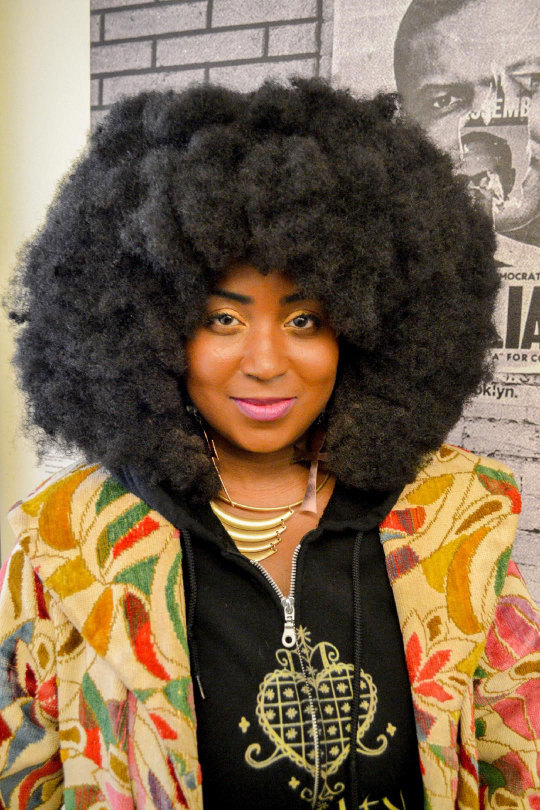
One of our booksellers, Caitlyn Wild, had the amazing opportunity to conduct this longform interview with author Sheree Renée Thomas. Her newest book is Nine Bar Blues: Stories from an Ancient Future, published by Third Man Books. Sheree is celebrating her book along with her Third Man “label mates” Alison Mosshart and Robert Gordon (who also have new books out) in our City Lights LIVE events series on Wednesday, October 21.
***
Caitlyn: This book is gorgeous on the inside AND the outside. This is one of my favorite covers of 2020, have to say. As I'm gazing wistfully at it here I see the subtitle, "Stories from an Ancient Future". Could you speak about what that phrase holds and conjures for you? Sheree Renée Thomas: Thank you! I wanted the cover for Nine Bar Blues to offer a visual clue to some of the characters, natural (and unnatural) landscapes, and themes in the stories. Third Man Books did a wonderful job of creating that sense of wonder and the verdant richness (cicadas, Egyptian gods, the moon, aliens, vines!) I was hoping for.
The subtitle, “Stories from an Ancient Future” is my riff on the idea that if humanity continues onward, we’ll someday reach a point where even our imagined futures are ancient. Some of the stories in the collection are set in the near future, alternate futures, the present, and the past. What would life be like if you existed in an ancient future? If time is relative, there is always a place where we can look back at ourselves (or our imagined selves) and see the grand sweep of time. What things remains the same, what falls away, is erased and remade again? The ancient future contains some of the wisdom of our past and some of our hopes for the future. It also contains our mistakes and fears. Will we be better off then, in this imagined future? Perhaps, at least I hope so. But that depends on what we carry with us and how well we learn from the lessons of the past. For me, it’s a blending of Ray Bradbury’s Martian Chronicles and the West African philosophy of Sankofa.
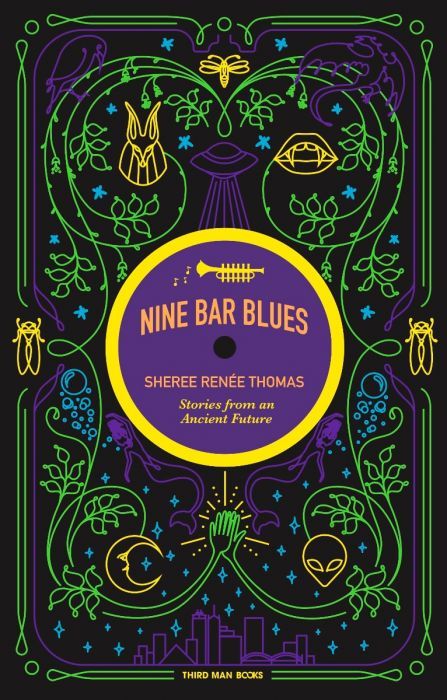
The story that really stayed with me in this collection was "Head Static". It put me in an altered state! I felt like I was watching the earth as it was being created, the deep gods and archetypes of our psyches emerging from the hum of the universe before my eyes, but in reverse. In short, I loved it! Could you tell us about the inception of the character in that story, Claire, and explain how she came to be in your mind and then on the page? That makes me so happy because Claire was one of those characters whose journey really haunted me. When I began writing her, I knew who she was but not why she was, or rather, how she had come to feel the way she did. Music became a way of thinking about the things that people share in common, around the world, throughout time. It is one of our greatest forms of expression. And music contains our deepest thoughts and observations on the world. But our culture is so obsessed with the cult of celebrity, in search of the next great thing. We worship youth and novelty, often at youth’s expense. There’s this constant drive for innovation and acceleration, while holding onto the dream of an endless life span. At what cost? To what end? Writing “Head Static” was a way for me to think about some of these ideas while exploring that deep musical connection. On October 21 we are excited to host you and two of your fellow Third Man Books authors, Alison Mosshart and Robert Gordon. Third Man also publishes another of my favorites, Janaka Stucky. As a reader I'm consistently enraptured with the authors and books they publish. I'm curious as to what the Third Man experience is like from the author's side? It’s been pretty exciting! First of all, if you ever get a chance to visit Third Man Records, go immediately because the space is just amazing. I don’t know how to describe it. It’s like a cross between Tim Burton and Ed Wood with a little Willy Wonka mixed in there? Fantastic design throughout and um, Jack White. Yeah, Jack White! Working with Chet Weise and the Third Man Books/Records team has been as close as my non-musical self has ever been to being in a rock band! There is a lot of good energy, great ideas, and collaboration, and the team is insanely supportive and creative. Between the kickass writers—poets, fiction writers, creative nonfiction—there’s a great deal of talent to just vibe with and connect. My fellow press mates are always working on new wonders, the kind of work that impacts the world—and that’s inspiring.
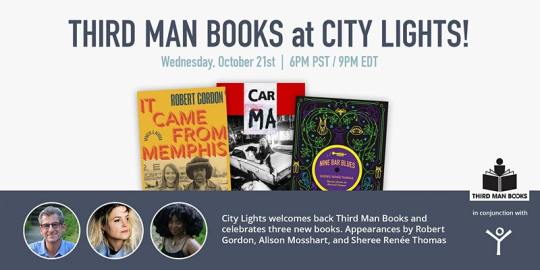
You are the first Black author to receive a World Fantasy Award for the groundbreaking collection you edited, Dark Matter: A Century of Speculative Fiction from the African Diaspora, which was published in 2000. (HELL YES). In another interview, you said you were inspired to put the book together because you were shocked it didn't exist yet. In 2020, is there a book you are shocked that has yet to be published? What books that have come along since 2001 are you glad about? There is at least one marvelous book that I do hope to see in the world before I roll out, and there are a couple of others that seem like their time has come, industry-wise, so we shall see. Back in ’98 when I was thinking on what would eventually become the first volume of Dark Matter: A Century of Speculative Fiction from the African Diaspora, I didn’t set out to create a groundbreaking project. I literally was just looking for more Black speculative fiction to read for fun, and when I didn’t find it in the bookstores, its absence puzzled me. With as many different anthologies that make up the genre, I was surprised that it hadn’t been done before. I’m really grateful I had the chance (and the courage) to do it. It’s been quite a journey! Since that first volume and the second one, Dark Matter: Reading the Bones, that came out in 2004, there have been many, many wonderful amazing books that pretty much put away the old arguments about Black writers not reading or writing this work. One book that I reviewed around the time I was working on the anthology was Nalo Hopkinson’s Brown Girl in the Ring. That novel felt like a game changer to me, because Nalo’s writing got us all so excited about the cultures and worlds we had not seen often in science fiction. She achieved this in a magical way that, while offering all the things we love about speculative fiction, rang true with a rootedness in Afrodiasporic culture. It didn’t feel like she was translating to us. Her writing, storytelling, and world building felt natural and true to itself. Today you could have a whole library of Black speculative fiction (and the scholarship that examines it), and that is beyond thrilling for me.
Between the diverse works of N.K. Jemisin, Andrea Hairston, Tananarive Due, P. Djèlí Clark—they cover a lot of imaginative ground--and a ton of exciting YA authors I cannot even begin to name, readers have a lot of new work and new voices to explore. It’s just an exciting time.
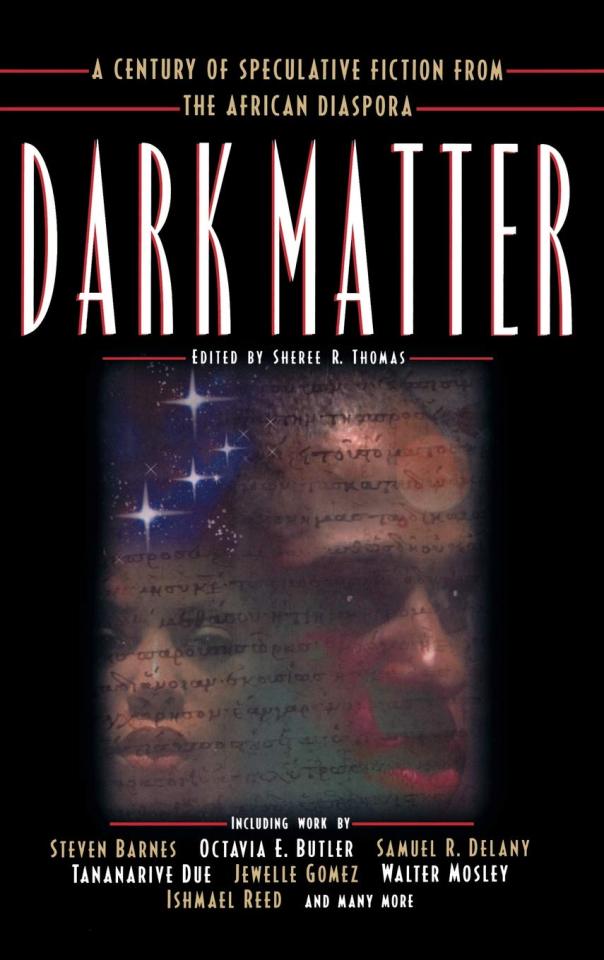
Finally, if you owned a bookstore or small press, what would it be called and what would your bestseller or focus be? I’ve been jotting down bookstore names for years! Here are a few: Beloved Books (this was invented during my Toni Morrison phase), focusing on the books people can’t stop discussing and all of our childhood favorites, too. Echo Tree Books (named after one of my favorite short story writers and poets, Henry Dumas, featuring all fantasy, science fiction, horror, and such).
Haint Blue Books (so I can paint every single wall the most stunning shades of blue, focusing on excellent fiction and world folklore with tons of poetry because sometimes, sadly, people be sleeping on the poetry, lol. Don’t sleep on the poets!). And my favorite, All Y’all Books (Southern lit and more! Plus a healthy selection of regional lit from other parts).
I love the last one the best because I can just hear folks saying, “You know you can get it at All Y’all Books!” or asking, “Where did you get that?” “Girl, at All Y’all’s Books. They have out of print and rare books, too!” Authors can say, “I’m going to be reading at All Y’all’s Books.” You can’t help but smile when you say that!
3 notes
·
View notes
Text
BOOKS
The last 10 books I’ve read:
1. Down The River - Edward Abbey I love Edward Abbey’s writing. I can’t imagine he was someone who was very fun to be around though. He seems like quite the curmudgeon and I don’t agree with some of his opinions, but I love his writing. This book is a mix of journal entries and essays. A lot of the entries took place while he was rafting down different rivers in America. Someone once described Abbey’s writing as Thoreau mixed with Hunter S. Thompson and I think that fits.
2. Beloved - Toni Morrison This was the first book I’d read by Toni Morrison. I’d been at a music festival in St. Stephen in 2019 and I’d heard a few quotations of hers that really moved me. I’d still like to check out her essays but I was somewhat surprised to find that I didn’t really enjoy this book. To be clear, it’s very well written and there are parts of it that I think are important to read. But large portions of the book revolve around a romance and that’s pretty much the only genre of book that I don’t enjoy. It’s not a romance novel per-se, but the romance aspects of the book didn’t hook me.
3. The Naked and the Dead - Norman Mailer This was the second book I read as a part of my book club. I wasn’t really sure what to expect. All I knew was that it takes place during World War 2 and that Mailer was apparently a controversial character. For the most part I liked this book. The soldiers all swear but Mailer writes it as, “fug” which is a minor issue but it does make it more difficult to take the book seriously. I felt the plot dragged a bit as it’s over 700 pages and it’s also fairly anticlimactic but the beginning and the middle were enjoyable.
4. Talking To Strangers - Malcolm Gladwell I’ve read a bunch of Gladwell’s books and I’ve listened to one of his podcasts a lot as well. His books read the same way he talks. You can hear his emphasis (often illustrated in italics in his writing). If you like that, you’ll probably like this book. He’s a good story teller but I have to read him in small bursts. The italics can bug me. It’s petty, I know, but there you have it.
5. The Plague - Albert Camus Another book club selection. To say reading this book during a global pandemic was eerie is an understatement. A pandemic breaks out and a town is quarantined. A lot of people die and the medical professionals are at a loss. There’s a lot of interesting theories and insights into human behaviour during a pandemic. It ran frighteningly parallel to our current situation for quite a lot of the book, and didn’t paint a very hopeful picture for a quarantine during the fall and winter. If you’re an anxious person I’d recommend waiting until after COVID-19 to read it.
6. The True Secret of Writing - Natalie Goldberg I won’t spoil it and tell you the secret. You’ll have to read it yourself. Another lovely book by Natalie Goldberg. I’m a big fan of her writing, her instructions on how to write and her incorporation of her Zen practice in both.
7. Colourless Tsukuru Tazaki - Haruki Murakami This was a new one for me. For the first time, I didn’t enjoy reading a book by Murakami. It’s not that it’s a bad book or poorly written or anything, it’s just boring. Nothing really happens and some of what does happen is very confusing. The main character, Tsukuru is supposed to be sort of bland. All of his friends names translate into colours but not his name. So he’s colourless and lives a fairly colourless life. It is what it is, it’s just not for me. I’m glad this wasn’t the first book of his I’d read.
8. What We Talk About When We Talk About Love - Raymond Carver A little while ago my wife and I watched Birdman again and this time it struck me that the play that Michael Keaton’s character has adapted for the stage is a short story by Raymond Carver. I’d read other collections of short stories by Carver before but I hadn’t read this one. So I checked it out. It’s classic depressing Carver. So, if that’s what you’re in the mood for, pour yourself a drink and enjoy.
9. Hyperbole and a Half - Allie Brosh Quite a while ago my dad gave me this book and asked me to return it to his sister. My aunt and I live in the same city so he thought I’d see her before he did. But then days went by and this book just sat on my bookshelf, unreturned. I bumped into my aunt a while ago and mentioned I had her book and she asked me if I’d read it. When I told her that I hadn’t she said to give it a glance and to hold on to it until I had. So, today I read it. It’s very funny and unlike any other book I’ve ever read. It’s sort of part book part comic book. Good stuff. But now I really have to give it back.
10. Bluebeard - Kurt Vonnegut It occurred to me recently that I haven’t read as many of Vonnegut’s books as I’d thought. I was going through my list of “books I’ve read’ and was surprised to find only three or four titles by him. I’d even read his son’s book, for goodness sake. For an author whose writing I so thoroughly enjoy, why had I read so few of his books? I couldn’t find an answer that I liked well enough, so I bought this book without knowing the plot and got reading. I’ll probably buy another one soon and do the same thing. As expected, I enjoyed this one. It’s not amazing, but his writing is unmistakeable and I sure do like satire. If you do too there’s a fair chance you’ll enjoy this book. Or, maybe not. So it goes. more soon, -joshua
1 note
·
View note
Text
Coming and Going: Misrecognition and Identity in Flannery O’Connor’s “Everything That Rises Must Converge”
Professor Richard A. Garner The Human Situation, April 15th, 2020
Outline
I. The Best Title in All of Literature
II. Misery Like a Coastal Shelf
III. The Injury of Intelligence, the Insult of an Education
A. Intelligence is a curse
B. A Martyr to the Desire of the Other; or, that St. Sebastian Painting One More Time
C. The Terror of Identity; or, Meeting Yourself Coming and Going

Richard Sexton,Oak Avenue, Wormsloe Plantation, 2009
I. The Best Title in All of Literature
“The past is never dead. It's not even past.”
—William Faulkner, Requiem for a Nun
In a second, I’m going to talk to you about the literary genre called the Southern Gothic. It’s the best. It’s weird and uncanny and disturbing, and it’s all ours. After that, I’m going to talk about the cursed intellectuals of O’Connor’s stories in general, and more specifically of our story for today, “Everything That Rises Must Converge” (1961). You might want to read the last one first, as it does the most close-reading, or the second one, which has lots of maps and stuff. But first, I want to tell you that “Everything That Rises Must Converge” is the best title in all of literature.
From the moment I read it on the syllabus as an undergraduate—circa the turn of the millennium— it took on a life of its own in my head. It’s one of those phrases we encounter in life that returns over and over again, coming to mind unbidden in situations that have nothing remotely to do with the themes of the story. Indeed, every time I go back and reread the story I am struck by how the title, like many of O’Connors, creates this tiny bit of cognitive dissonance, this strangeness that makes it at once both absolutely perfect and deeply unsettling: a stark line of poetry that stands over and above the story, its own little work of art.
And I say this knowing—as you may as well, if you read Giroux’s introduction—that the phrase comes from the Jesuit philosopher Teilhard de Chardin: “Tout Ce Qui Monte Converge” (xv). Robert Giroux relates that the phrases appears in French, in an anthology he had sent O’Connor of the philosopher’s work. Yet, if anything, going back and reading Teilhard de Chardin and how he uses the phrase makes O’Connor’s usage of the phrase embettered, not worsened, by the repetition. Here’s the version of the passage most often quoted, which is not actually the philosopher’s but one of his students/anthologists. From Max H. Begouen’s Foreword to Building the Earth: “He gave each of them this watchword: ‘Remain true to yourselves, but move ever upward toward greater consciousness and greater love! At the summit you will find yourselves united with all those who, from every direction, have made the same ascent. For everything that rises must converge’” (13). Here’s one version in his own words, from the essay “Faith in Man,” expressing a major theme in the philosopher’s work: “Followed to their conclusion the two paths must certainly end by coming together: for in the nature of things everything that is faith must rise, and everything that rises must converge” (186). In other words, where Teilhard de Chardin is saying something about the nature of our common humanity converging in ever-greater complexity and perfection, O’Connor is injecting something insistent, something dark into this message of hope. In doing so, she is not trying to negate the utopian vision of the philosopher, but to transform it by way of adding in the full range of human experience. For O’Connor, thinking about convergence means thinking about life in a place where sectarianism is stuck on the Catholic/Protestant divide so strongly that to be a Catholic is so alien that one might as well be Jewish (and anything further afield would be meaningless to the young Church of God boys); where buses had only been desegregated in Browder v. Gayle five years before she wrote the story; and where the number of women receiving PhDs in Philosophy in the 1950s—much less in the South—was vanishingly small. In other words, O’Connor injects a certain Southern peculiarity combined with a bit of Gothic uncanniness into this convergence. Faith, theological or not, is easy when it does not have a world to contend with, and if it is easy, it is no faith at all.
But before we talk about the Southern Gothic, I want to return to the title, because I love it so much. Ultimately, beyond any particular meaning it derives from and alongside the story itself, it’s the beauty of a phrase that lingers in one’s mind, insists on coming back again and again, that I want to discuss. I want to discuss it because it gets at the heart of something about literature. For instance, when I say it’s “the best,” on what criteria am I basing that judgement? Are those objective, or purely subjective? Am I repeating a mistake we see from so many of O’Connor’s characters, of assuming that their personal preference can stand in for everyone else’s (and that those who disagree must be wrong)? Short answer: no. I’m saying this for effect. I know it’s just me. But the longer answer is that the particularity of my judgment on this title does give us a clue to the universality of something about language. Our psyches are, ultimately, linguistic; all the sense-experience, emotions, and logic that we deploy emerges out of and is filtered through language. Language makes possible what we can know of our world, and some of the greatest tragedies of our lives are marked by our inability to find a language that fits our experience—of love, of friendship, of betrayal, of death—often because someone else is imposing their language on us, or because there is no language at all for it. Sometimes we have to invent it. I don’t know what part of my self, per se, needs the phrase everything that rises must converge, but some part does. Thank you, Flannery O’Connor.
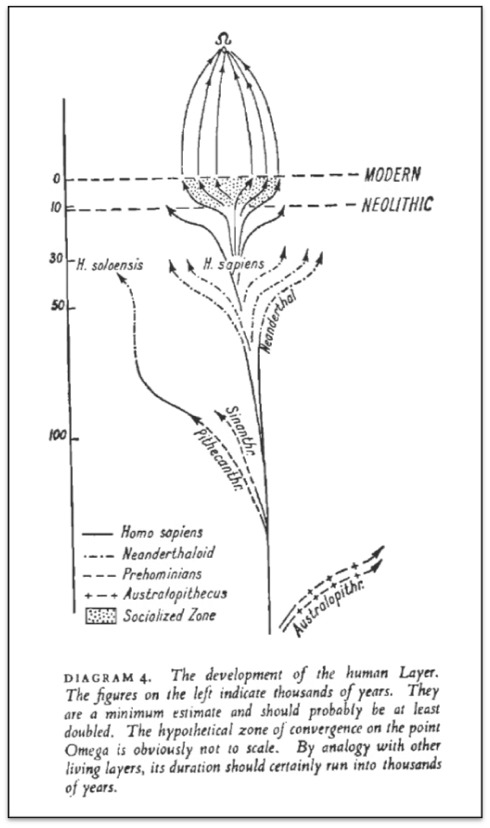
Pierre Teilhard de Chardin, The Phenomenon of Man, 1955
II. Misery Like a Coastal Shelf
Man hands on misery to man.
It deepens like a coastal shelf.
—Philip Larkin, “This Be The Verse”
What is it about the South that lends itself to the gothic? Ever since Edgar Allen Poe’s American reinvention of that European genre—of ancient curses, crumbling castles, monsters and murderers, of innocent women in distress and dark and stormy nights—Southern literature has often veered of into the uncanny and horrific as it’s modus operandi. And the answer as to why? Well, it’s not all the decaying castles scattered across the countryside. The answer is obvious: it’s slavery. The deep secret, the obscure past, the meaningless descent into gratuitous violence, the uncanny return of repressed trauma and desire: slavery.
Let’s take a tour of some maps… First, what do you think this one is?
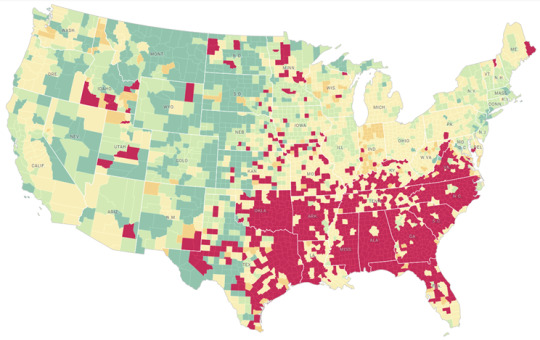
If you answered “a map of which parts of America started socially distancing when during the pandemic,” then you are a winner. Here’s the key I excised from the original New York Times article the map appeared in (Ganz et al).
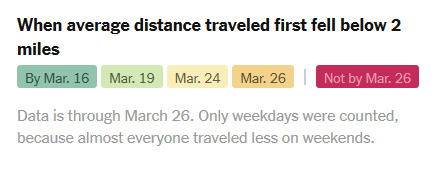
You’d be forgiven for mistaking this for a map of a lot of different things, but let’s cut to the chase. Here’s the second map:
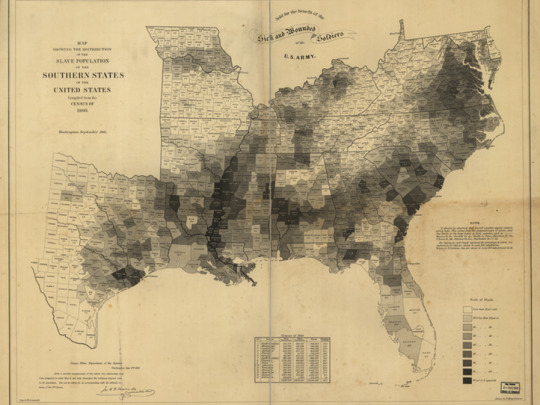
In case you’re having difficulty reading the title, let me help with this U.S. Coast Survey from 1861: “Map showing the distribution of the slave population of the southern states of the United States.” But just in case the point is not clear yet, here’s map number three:

That, everyone, is a map of the United States as it looked during the late Cretaceous period, many millions of years ago (126-65 mya, to be geologically precise; see Krulwich). That inland sea left rich alluvial deposits that became the fertile crescent of land known as, first geologically and then politically, the Black Belt. Needless to say, the agricultural quality of the land correlates strongly with the intensity of slavery practiced in the American South.
In Sigmund Freud’s Civilization and Its Discontents (a book we read often here in The Human Situation), the psychoanalyst uses the metaphor of the ruins of Rome to talk about the deep history of our own human minds. He wants us to understand how, even after they’ve been totally erased and are irretrievable, our earliest experiences shape who we are, just as the long-obliterated strata of Rome each successively dictated what was built after them. For me, when Larkin evoked misery deepening like a coastal shelf, Freud’s ruins of Rome and the cretaceous South sprang immediately to mind; I took it not as simile, but something that could be, often is, literally true.
This is what is meant in Faulkner’s famous epigraph about the past never being dead. Southern Gothic emerged as one of the most distinctive genres, blending mystery and murder and a deep sense of a looming violence in the world. Flannery O’Connor’s stories, as we have all seen, could easily be turned into horror movies, and William Faulkner’s work also includes many of the same themes. If we include Toni Morrison and Cormac McCarthy (e.g., the hauntings in Beloved or the demonic Judge of Blood Meridian), then the genre is easily the defining movement of twentieth century American literature. And it is not only slavery, but the history of violence that is the warp and weft of the institution, that colors our Southern Gothic. The Civil War is still the deadliest war in American history, and it’s not even close. Indeed, scholars have argued, often convincingly, that the region has to this day not recovered from the economic, social, and political devastation caused by the military conflict alone, not to mention its aftershocks, the devastation like a modern war fought 75-100 years before its time. “The past is never dead. It's not even past.”
III. The Injury of Intelligence, the Insult of an Education
A. Intelligence Is a Curse
As I’m sure you’ve noticed by now, O’Connor’s stories are chock full of characters for whom their intelligence is a curse. Hulga almost causes her mother an existential crisis because the pleasure- reading she leaves lying around is Heidegger’s “What Is Metaphysics?”; The Child is clearly the smartest one in the room; even The Misfit was marked off at a young age: “‘You know,’ Daddy said, ‘some that can live their whole life out without asking about it an it’s other has to know why it is, and this boy is one of the latters’” (129). So, too, Julian.
Julian is a writer who does not write. Like Hulga, whose philosophy is solely for herself, Julian’s fantasy world is solely for himself. And he seems to know that he is not a writer—he never expects to make a life/career/money out of it—which forces us to ask: why does he identify as a writer? But before we answer that question, let’s get right to the stakes. The clue is in the title, and O’Connor doesn’t make us wait too long. Immediately after she tells her son that he should be proud that his ancestors owned hundreds of slaves, Julian’s mother gets down to commentary on civil rights: “They should rise, yes, but on their own side of the fence” (408, emphasis added). So, rise: yes; converge: not so much for Julian’s mother. It is no mistake that this story takes place on a bus, the public space Rosa Parks made famous and which the Supreme Court desegregated in its 1956 ruling in Browder v. Gayle, five years before this story was published; the bus, for O’Connor, is again not a metaphor for race relations, it is the thing itself. Thus, unlike for Hulga, Julian’s fate and choices are going to extend far beyond himself—to the status of racism in America, the history of slavery, and reparations therefore—although they will extend to himself, too. Perhaps O’Connor is saying that the repercussions of the choices of the two, philosopher and writer, have different stakes. Perhaps.
Which brings us back to all these emotionally fraught intellectuals here, decaying slowly, like fish out of water, in their Southern hometowns. This theme is important for O’Connor because it argues intelligence, reason itself even, can serve not as something that enlightens, but something that closes off, distances, and deceives. The dark of reason. Like The Child in “A Temple of the Holy Ghost,” they can only see the difference in all things, and not the sameness; there are parts of everyday life that they have utterly rejected, and thus cannot connect to; they are alienated on their own soil, homeless in their own homes. And often with good reason! Julian’s mother is an out and out racist, and she represents the norm. He should reject her racism. But, for some reason, he cannot reject her herself. And he cannot reconcile the one to the other. I love her: she’s a racist; I must reject racism: I must reject her. His very love for his mother is a source of immense guilt for Julian, and that right there is the essence of the Southern Gothic.
There is a deeper lesson here, one that we don’t really have time for, about how Julian is actually trying to inhabit two different symbolic worlds, ones with different rules that justify themselves in different ways and that are ultimately incompatible. It’s like he speaks two different languages, but thinks they’re the same one and so often gets hopelessly confused. And the truth is something like that, when we recognize that culture is like a language that sets up rules for what and how we make meaning of the world. Heidegger famously said: “Language is the house of Being. In its home man dwells” (217). Hulga and Julian, justifiably reacting to the smallness and violence of the world they grew up in, have learned another world, but tragically cannot see their way back across the divide they have built; they’re emotionally attached, but intellectually distant, so they take refuge in that distance and decay psychologically, along with the old plantation mansion that Julian can’t help but dream about. Perhaps this is a problem O’Connor understood all too well. Her writing teacher in the Iowa MFA program had to ask her “to write down what she had just said” the first time they met her Georgia accent was so thick (vii, all emphasis mine).
B. A Martyr to the Desire of the Other; Or, that St. Sebastian Painting One More Time
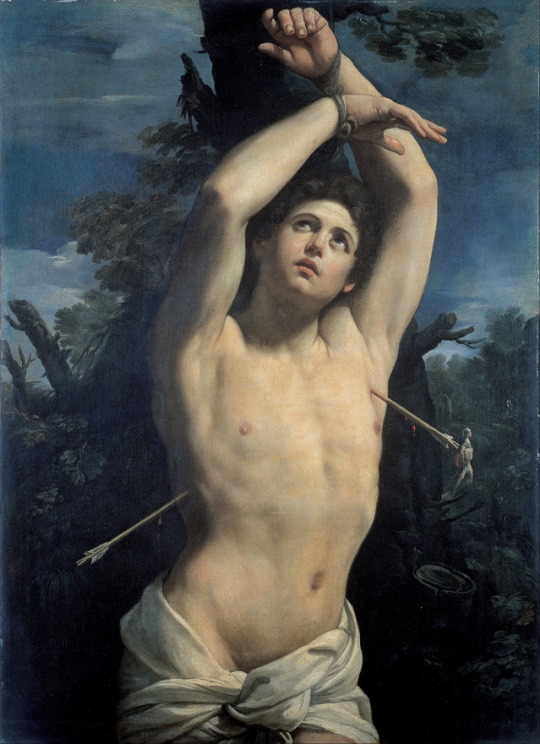
When I worked in that highly suggestive, very famous painting of St. Sebastian into my lecture on Voltaire, I had totally forgotten that our erstwhile saint figured into our story for today, even though I had been reading O’Connor again over break. Sometimes the Unconscious, to paraphrase Larkin, fucks you up, but every now and again it does you a favor.
One of Julian’s fantasies is that he is a martyr to his mother. This should right away give us some pause. Take this for instance: “Everything that gave her pleasure was small and depressed him” (405). There is something deeply wrong with Julian’s relationship to his mother here; in fact, this is not a healthy relationship to have with any human being. Why on earth does Julian care what gives his mother pleasure? Shouldn’t he be happy that she is happy, despite it being over a ridiculous hat? Why would you ever arrange it so that, in the most important relationship in your entire world, anything that makes the other person happy makes you sad? That, my friends, is a recipe for disaster, death and disaster and tragedy. You don’t even have to read to the end. This is not going to end well.
To understand characters, you have to understand their motivations. This can be tricky. We can’t assume the characters are us, or anyone else but who they are. There are many possibilities for why Julian does what he does—alien mind control, for instance—but very few plausible ones. What, then, are Julian’s plausible alternatives here to his misery. Alternative one: leave his mother and move far away. He wants to be a writer? New York City, Paris, hell Houston or Atlanta: get thee hence. Anywhere but here (Hulga, too). Why, then, does he stay? We can be very, very cynical and say that Julian is broke and his mom’s supporting him. True! But not really enough. A lot of life can be lived in cheap apartments with ramen noodles, even on the commission of a typewriter salesman. This would be an excuse he would be telling himself, though we should also assume that many of the jobs he might be qualified for he would reject because they would conflict too heavily with his identity (as a writer), or just embarrass him (as being beneath him and his college education).
I think the real clue is in the saint imagery. But it’s not him who’s the saint, it’s his mother—a fair description for her achievements vis-à-vis Julian, which are not small, and which she is justly proud of. Even if taken literally, if he is suffering for his mother, as a saint, that means his mother is Jesus! His non-sacrifice of riding on a bus with his mother—“the time he would be sacrificed to her pleasure” (406)— is really her sacrifice. The problem is that, in this twisted relationship, his mother-the-saint is also a racist. Moreover, he knows that she’s not doing this for her pleasure: her doctor has told her she might die if she doesn’t become more active. Yet that’s how he frames it, which makes no sense … unless, here again, we should take this more literally than he means it: she’s staving off death, and as long as she is alive and enjoying life, then of course he cannot enjoy it. Ipso facto, he wants her to die, so he can move on. Again, her very existence is a source of guilt for him. Not because he hates her, but because he loves her.
C. The Terror of Identity; Or, Meeting Yourself Coming and Going
What does the phrase “you won’t meet yourself coming and going” (407) even mean? I had to pause at this phrase after O’Connor repeats it in the story, making sure to remember, as Professor Charara reminded us, that just because it is a cliché for the characters doesn’t mean that it is one for O’Connor. In short, it signifies a desire for uniqueness. If you do not meet yourself coming or going, you will not see someone else that looks like you on your journey.
This desire—to be singular, unique—is a pretty basic one. We all need some manner of distinguishing ourselves from others, otherwise the difference between self and other breaks down, and what it means to be uniquely our self does with it. This loss of self is, in almost all cases, terrifying for us. It is terrifying for Julian, because it is precisely what he fears in relation to his mother: he will never have his own desires, his own identity, but merely be an extension of hers, subsumed by his mother’s identity, her view of him. He will always be, as Professor Wallace discussed, an object and never a subject. (At the same time, to have nothing in common with other human beings is an opposite extreme, untenable as well. What it would even mean, to share no qualities with other people, no common bond over which you could unite, no language, aspirations, or anything else? Nothing.)
Of course, his mother does indeed meet herself going to the reducing class, in the form of a black woman with her child, angered about … something. Long story short, this woman hits Julian’s mother and storms off when she tries to give her child a penny. There is much to be wrung interpretively from whether or not it is this blow that causes his mother’s death, or Julian’s reaction to it. But I think this is a bit beside the point, much as the hat is. The truth of the situation is in Julian’s belated realization of his unacknowledged love for his mother—he calls out to her as a mother would to a child, or even a lover to their beloved, at the end, “Darling, sweetheart, wait!” (420)—and with that, his imminent “entry into the world of guilt and sorrow” (420). His coded wish for his mother’s death has been granted, but in so doing all the compromises he has made will no longer be tenable. He will, of course, blame himself for the way he acted vindictively toward her, even in her last moments, and he might even blame himself for her death.
Most of all, though, he will lose his ability to maintain that ironic distance that he has adopted toward the world, the one that has kept him locked into a fantasy world. There is compensation here: that fantasy allows him to live the life he secretly desires—not incidentally, the one where he can acknowledge his mother’s love and sacrifice, if not in word, then in deed. He does devote himself to his mother; despite what he says he is on that bus. The “in word” part is crucial here. Julian wants to be a writer because it allows him to keep an ironic distance toward the world as the detached observer who can catalogue all the worlds foibles while imagining that he is the hero setting them aright. But not in the real world, which is a bit too messy. When he imagines marrying a black woman, he tempers this fantasy by writing his fictional lover as not too black, her race only a suspicion (414). When he befriends black folk in his fantasies, it is only “the better types” (414). And when he imagines joining a sit-in, this is “possible but he did not linger with it” (414). Of course the possible is not something he lingers with! There is no ironic distance in the possible. Only jail, maybe even death. In fact, in a very real sense, Julian needs injustice to continue, because if it disappeared he would be forced to confront everything that he is fobbing off. Thus: “It gave him a certain satisfaction to see injustice in daily operation. It confirmed his view that with a few exceptions there was no one worth knowing within a radius of three hundred miles” (412).
I think a more interesting question than whether or not the child’s mother is responsible for Julian’s mother’s death is why she is angry to begin with. Julian is probably not wrong, that negotiating the casual violence of an antiblack society has shaped her outlook, and primed her for confrontation as an understandable survival strategy (compare her to the man who buries his nose in a newspaper, learning about the world at large while ignoring the world at hand). But perhaps we should look closer to home. If you were a mother negotiating public transit with your child, might you be annoyed if a grown man—a white man, in this very specific instance—forced you to split yourself off from your young child? And, assuming that she’s as good a reader of the world as Julian is, when you realize that he’s forced you into this situation because of some tiff he’s having with his mother? Julian delights in the fact that the children have been split from their mothers; he is himself keenly aware of the dynamic at play here. But because he is trapped in his own bubble—his own decaying mansion of the mind—he cannot see that maybe she does, too. And if Julian’s desire to separate himself from his own mother is achieved in this awkward social situation, it is imposed upon the mother and her child. Yet the stakes for each are different, and Julian knows this, too. He sees it coming from a mile away, but what he can’t see is that the cause is not his mother, but himself, and he cannot see it because then he would be the one thing he cannot be, his mother. He would see himself coming and going, in her.
Bibliography
Femia, Will. “Paleo-Politics: The Really Long View.” MSNBC, 24 Aug. 2012. Msnbc.com, http://www.msnbc.com/rachel-maddow-show/paleo-politics-the-really-long-view.
Glanz, James, et al. “Where America Didn’t Stay Home Even as the Virus Spread.” The New York Times, 2 Apr. 2020. NYTimes.com, https://www.nytimes.com/interactive/2020/04/02/us/coronavirus-social-distancing.html.
Heidegger, Martin. Basic Writings: From Being and Time (1927) to The Task of Thinking (1964). Rev. and Expanded ed, San Francisco: Harper, 1993.
Helms, Douglas. “Soil and Southern History.” Agricultural History, vol. 74, no. 4, Agricultural History Society, 2000, pp. 723–58. JSTOR.
Krulwich, Robert. “Obama’s Secret Weapon In The South: Small, Dead, But Still Kickin’.” Krulwich Wonders. NPR.Org. 10 Oct 2012. https://www.npr.org/sections/krulwich/2012/10/02/162163801/obama-s-secret-weapon-in-the-south-small-dead-but-still-kickin. Accessed 14 Apr. 2020.
Mullen, Lincoln. “These Maps Reveal How Slavery Expanded Across the United States.” Smithsonian Magazine. www.smithsonianmag.com,
Faulkner, William. Novels, 1942-1954. New York: Library of America, 1994.
O’Connor, Flannery. The Complete Stories of Flannery O’Connor. Farrar, Straus, and Giroux, 1972.
Reni, Guido. Saint Sebastian. Circa 1615. Musei di Strada Nuova, Wikimedia Commons, https://commons.wikimedia.org/wiki/File:Guido_Reni_-_Saint_Sebastian_-_Google_Art_Project_(27740148).jpg.
Sexton, Richard. Oak Avenue, Wormsloe Plantation. 2009, https://richardsextonstudio.com/wp-content/uploads/2015/06/19-c070.jpg.
Teilhard de Chardin, Pierre. Building the Earth. Wilkes-Barre, Pa. : Dimension Books, 1965. Internet Archive, http://archive.org/details/buildingearth0000teil_y0u0.
——. The Future of Man. New York: Doubleday, 2004.
——. The Phenomenon of Man. New York: Harper Perennial, 1955.
2 notes
·
View notes
Text
Happy Birthday to one of my literary heroes, Toni Morrison, whose passages still amaze me no matter how many times I’ve read her books.
The Bluest Eye
“She left me the way people leave a hotel room. A hotel room is a place to be when you are doing something else. Of itself it is of no consequence to one's major scheme. A hotel room is convenient. But its convenience is limited to the time you need it while you are in that particular town on that particular business; you hope it is comfortable, but prefer, rather, that it be anoymous. It is not, after all, where you live.”
“We mistook violence for passion, indolence for leisure, and thought recklessness was freedom.”
“She seemed to fold into herself, like a pleated wing. Her pain antagonized me. I wanted to open her up, crisp her edges, ram a stick down that hunched and curving spine, force her to stand erect and spit the misery out on the streets. But she held it in where it could lap up into her eyes.”
Sula
“It was a fine cry - loud and long - but it had no bottom and it had no top, just circles and circles of sorrow.”
“She was the third beer. Not the first one, which the throat receives with almost tearful gratitude; nor the second, that confirms and extends the pleasure of the first. But the third, the one you drink because it's there, because it can't hurt, and because what difference does it make?”
“Lonely, ain't it?” “Yes, but my lonely is mine. Now your lonely is somebody else's. Made by somebody else and handed to you. Ain't that something? A secondhand lonely.”
Beloved
“There is a loneliness that can be rocked. Arms crossed, knees drawn up, holding, holding on, this motion, unlike a ship's, smooths and contains the rocker. It's an inside kind--wrapped tight like skin. Then there is the loneliness that roams. No rocking can hold it down. It is alive. On its own. A dry and spreading thing that makes the sound of one's own feet going seem to come from a far-off place.”
“He licked his lips. ‘Well, if you want my opinion-‘ ‘I don’t, ‘ She said. ‘I have my own.”
“In Ohio seasons are theatrical. Each one enters like a prima donna, convinced its performance is the reason the world has people in it.”
48 notes
·
View notes
Note
any book recs?
Heck yes I do!
Simon VS. The Homo Sapiens Agenda by Becky Albertalli: Even if you saw the movie already, the book is like a different storyline. They’re super close but very different and I literally can’t decide which I prefer
It by Stephen King: I’m not actually the biggest horror fan of all time but after seeing the movie, I fell in love with this idea. I’m only about half way through the novel version, but there is something insane about the way Stephen King writes. He truly understands human’s on a level not many people do, or at least understands them enough to REALLY draw out the true horror of the world. I don’t know man, it’s a good fucking book.
Frankenstein by Mary Shelley: Actually though, i re-read this after having read it 6 years ago, and holy shit this is actually amazing. I love this novel. Frankenstein is… a fascinating story.
The Book Thief by Markus Zusak: Seriously fucking amazing. It’s about a little girl growing up in Nazi Germany only it’s told from Death’s point of view, and I know what you’re thinking - how the fuck? But holy shit it is a fucking crazy good story, and the character of Death had me hooked on the first page
The Story of Edgar Sawtelle by David Wroblewski: One of my all time favorite books. It’s kind-of sort-of the story of Hamlet, but with a totally different modern revamp. The main character is mute, was born mute, and his closet relationship is with his dog. His mom marries his uncle after his father dies in a fire, and.. well. It’s just incredibly beautiful and amzing.
The Sword of Truth series by Terry Goodkind: Look. This is the longest book series I have ever read. I used to spend every second of every day reading these books. But if you’re a fantasy fan, and huge word counts don’t scare you, then good LORD is this the series for you. I think back on this series so fucking often, and I’ve read certain books in it like, six times each. Currently, my mom has my copies or I would be READING IT AGAIN since this series hass been on my mind alot again. Again, it’s super long. I think currently we’re on book like… 27. I googled it. holy shit it’s grown since I last picked it up. The best part about this series is 1. You can technically stop at any point because each book has a relatively good ending that will keep you satisfied (except book 1 and 2, you really have to finish 3 while youre at it). 2. They reflect the modern world so well sometimes you’re just godamn wow. Seriously. If you love fantasy, please give it a try. It’s worth it.
The Host by Stephanie Meyer: Look, I know what you’re all going to say. Twilight was terrible, why would we read this? Listen, LISTEN I actually love The Host. It was really well done, and it definitely Stephanie Meyer’s better novel. The movie adaptation sucked ass but I actually DO still read this book over and over again. It’s a sci-fi novel about alien’s coming to Earth and taking over host bodies. They do this on lots of planets, and Earth is their newest requistion. It’s also the only planet to fight back well enough that the aliens actually think they might win. It’s not as weird as it sounds. It’s a love story, and it goes far more in depth with the meaning of life and stuff like that then Twilight could dream of, so give it a try.
The Handmaid’s Tale by Margaret Atwood: Actually amazing. I read it for class like… idek, 5 years ago maybe? When I heard it was getting it’s own show I was like !!!! but I haven’t actually watched the show version yet, so I have no idea how it compares to the novel. The novel is fucking amazing though. Legit made me cry. However, if you have a sexual trauma or trigger, this might be a difficult read in some select parts :/ Still fucking worth it times ten. I literally bought the book when my class was over, it was so good (the teacher actually, actually handed out copies, how insane is that? She was amzing)
Beloved by Toni Morrison: FUCK SO GOOD. I’ve read it twice, both times around school, and got to write papers on it twice as well. This is… this is one hell of a book. Both times I read it, I got so much more of it than the first time. THERE IS SO MUCH TO UNPACK. It’s about a former slave whose haunted by the baby daughter she killed to prevent her children from ending up slaves as well. This was just before slavery was abolished, as well, and while her baby daughter died, her other three kids lived. However, now her home is haunted, and the baby ACTUALLY comes back. It’s crazy and amazing and one of my favorite novels of all time. I can’t pick favorites guys, okay, but I love this one so fucking much.
Pellinor Series by Alison Croggon: Listen. Listen. I read this book when I was in high school immediately after I hurt my back so bad I was stuck in bed for a week, and literally continue to have issues with too this day. I CANNOT TELL YOU what the fucking plot was, and apparently there are 2 more books in the series that I didn’t know about, BUT I LOVED AND ADORED THIS BOOK OKAY IT WAS A WONDERFUL FANTASY NOVEL AND IT HAS A FEMALE LEAD ALRIGHT ITS GREAT JUST TAKE MY WORD FOR IT AND READ IT
Uglies Series by Scott Westserfeld: I remember finally getting my hands on this series and reading it in like, two days. Idk. It was great. If you can’t tell, I love fantasy and sci-fi and horror, which all mesh together horribly and you can never tell them apart. This isn’t horror though, just the other two. It’s about a world where when people turn a certain age, they get to become a “pretty’ which means to have surgery done to make them look perfect - only the reason for this is to dumb down society. Read it. I love it.
Vampire Academy by Richelle Mead: I love vampire novels. If you couldn’t tell, this is a vampire novel. It’s one of my preferred series though, I think Mead did an amazing job crafting the world she crafts. Vampires aren’t under wraps, nor are they inherently evil, but they do work in a really weird system where you have the Special vampires who the other vampires protect, and then like the bodyguard vampires. I can’t fully remember, it’s been a long time. But regardless, I remember this being one of the few novel series that made me cry, and I still love it to this day.
Harry Potter by JK Rowling: I thought this was such a give in that I didn’t put it on the list until now but actually like. Super good. I grew up in this series and sometimes I talk about it and remember I’m 24 cause some people I know have never read it and IT WAS LITERALLY MY CHILDHOOD. Still think it’s worth it, even as I poke more and more holes in the story, because the older you get, the more you start to recognize problematic things. Clearly, Harry Potter was meant for children, not an adult who wants to critize everything. GOOD READ THOUGH
Fangirl by Rainbow Rowell: I grew up the girl writing fanfiction hid away in the back of the class because I didn’t want anyone to know. I look up to the people older than me at the time who developed and crafted the world we live in now, where Fanfiction is almost acceptable. Reading this novel... brought me right back to the Harry Potter days when the fandom was sitll new, underground, and ao3 didn’t exist. Honestly... it’s a really good book, and really hits home for people like me who write fanfiction and want nothing more than to write novels one day.
Game of Thrones by George R.R. Martin: But actually the books are really good. I fucking adore the show and that’s what got me into the books, but the books are HELLA good. Weirdly, Daenery’s Targaryen is not the most well written character ever, and I blame it on Martin being a guy, becasue sometimes I actually hate her in the novels (seriously, he makes her sound... like a child, which I guess she kind of is) BUT one of my favorite things in the novel is that her husband Khal Drogo does not sexually assault her in the novels. He’s super sweet and good to her, and honestly just. Yep. Yeah. Good series.
What Happened to Lani Garver by Carol Plum Ucci: The most heartwrenching book of all time. I can’t tell you how long I cried over this book. I’m literally getting tearful as I think about it. It is... fucking BEAUTIFUL. I want to read it right this fucking second. It’s about a girl who was in remission from cancer, but who joins the cheerleading team. Only, shes technically too tall to be a cheerleader, so she gets an ED which actually puts her at risk for remission. She meets Lani Garver - the literal emodiment of a nonbinary person before that term every existed. Lani Garver is... a fucking angel. An actual angel okay. They help the main character through so much, specifically bullying, and Lani taught ME so much when I read it. The author refers to Lani as he, but remember that it was written before nonbinary was an accepted (possible even before it was a fully labeled) thing, but the book is SO worth reading. I. I’m going to go read it again.
Streams of Babel and it’s sequel The Fire Will Fall by Carol Plum Ucci: I originally read the second novel first on accident, which just goes to show you how good an author Ucci is becasue I didn’t even NOTICE until I got to the end and saw there was a first novel, oops. But, its a take on the lives of 4 kids in a situation of chemical warfare, and what happens to them when they get poisoned by the water. I think one of the kids is a fucking comptuer genius. Idk, I can’t fully remember, but it is one of my favorite novels, so check them out.
I’m like 100% that there’s more I could list but those are the ones I could currently recall BECAUSE THIS IS A MONUMENTAL TASK AND I LOVE BOOKS
93 notes
·
View notes